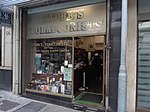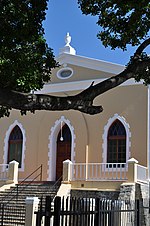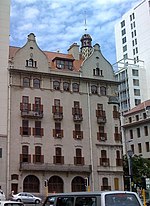Long Street (Cape Town)

Long Street is a major street located in the City Bowl section of Cape Town, South Africa. It is famous as a bohemian hang out and the street is lined with many book stores, various ethnic restaurants and bars. Restaurants include African restaurants such as Zula, and Indian restaurants such as Masala Dosa. Long Street exhibits a diversified culture and attracts tourists from all over the world. It also has a number of youth hostels which provide accommodation to an international roster of guests. Several theatres which showed anti-apartheid plays were located on the street during the 1970s and 1980s, although most have now closed and been replaced by restaurants or stores. Architecturally it is noted for its Victorian buildings with wrought iron balconies. These were featured in an article in an edition of the annual publication The Saturday Book.Traffic on Long Street is one-way in the uphill (southwest) direction, while the parallel Loop Street carries downhill traffic. The number 101 MyCiTi bus runs the length of Long Street on its way from the Civic Centre to Gardens, with five stops along the street.
Excerpt from the Wikipedia article Long Street (Cape Town) (License: CC BY-SA 3.0, Authors, Images).Long Street (Cape Town)
Long Street, Cape Town Cape Town Ward 115
Geographical coordinates (GPS) Address Nearby Places Show on map
Geographical coordinates (GPS)
| Latitude | Longitude |
|---|---|
| N -33.921666666667 ° | E 18.42 ° |
Address
Monarch House
Long Street
8001 Cape Town, Cape Town Ward 115
Western Cape, South Africa
Open on Google Maps







